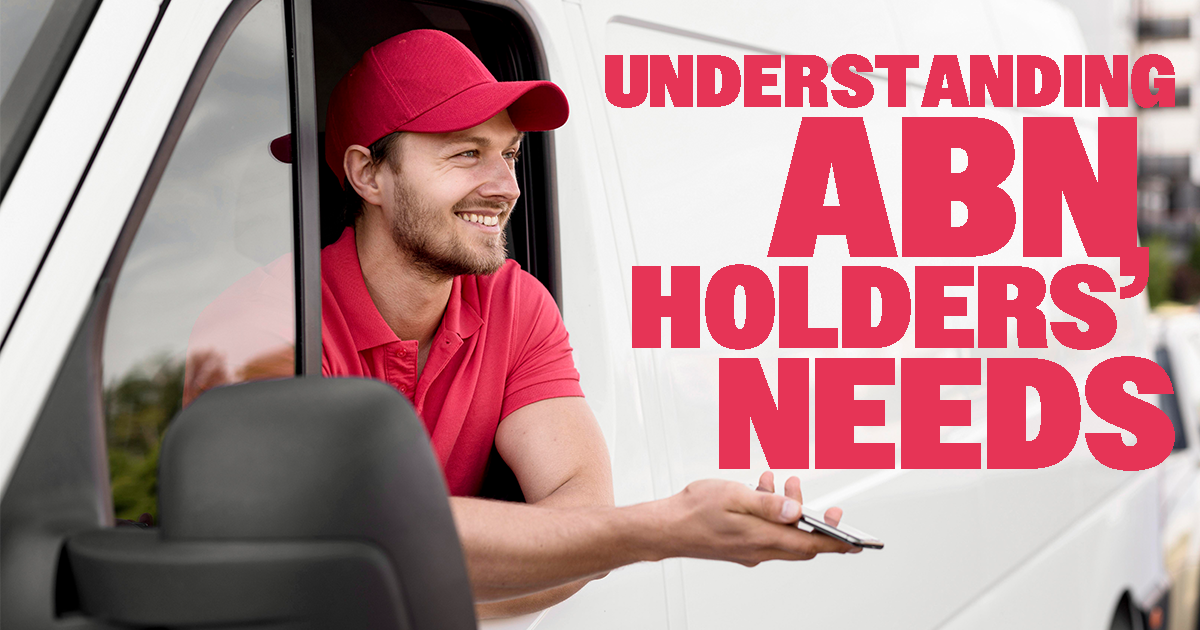Share this
Car Lease vs. Low-Doc Car Loan: What's Best?
by Larissa F. Gasperi on Jan 17, 2024 2:34:26 PM
For ABN holders, deciding between a car lease and a low-doc car loan is a critical financial decision that can significantly impact business operations. Each option offers its own set of benefits and limitations, and the right choice depends on various factors like cash flow, business structure, and long-term goals. This guide is designed to help ABN holders navigate this complex decision. We will explore the nuances of both car leases and low-doc car loans, weighing their pros and cons, to provide you with the insights needed to make an informed choice that aligns with your business needs. Whether you're a sole trader, a small business owner, or managing a fleet, understanding the best financing route for your vehicle needs is paramount. Let’s delve into the world of car financing for ABN holders and discover what’s best for your business journey.
Skip to:
- Understanding ABN Holder Needs
- What is a Car Lease?
- Pros and Cons of Car Leasing for ABN Holders
- What is a Low-Doc Car Loan?
- Pros and Cons of Low-Doc Car Loans for ABN Holders
- Comparative Analysis: Lease vs. Low-Doc Loan for ABN Holders
- Specific Challenges for New ABN Holders
- Getting Started: Qualifying for a Business Car Loan
- Application Process for Low-Doc Car Loans with Ausloans
- Maximising Approval Odds with Ausloans Finance Group
- Special Considerations for New ABN Holders
- Making the Right Choice for Your Business
- Conclusion
Understanding ABN Holder Needs
Before delving into the specifics of car leases and low-doc loans, it's crucial to understand the unique financial landscape of ABN (Australian Business Number) holders. These individuals or entities have distinct needs that set them apart from typical consumers in the car finance market.
- Business vs. Personal Use: Many ABN holders require vehicles primarily for business purposes, which can influence the type of financing they choose.
- Cash Flow Considerations: Business cash flow can be variable, requiring more flexible financing solutions.
- Tax Implications: The choice between leasing and loaning a car can have different tax implications, especially regarding deductions and GST claims.
- Credit Requirements: ABN holders, especially those with new or small businesses, may face different credit assessments compared to personal loan applicants.
In this section, we’ll explore how these unique factors play a crucial role in deciding whether a car lease or a low-doc car loan is more suitable for an ABN holder. Understanding these aspects is key to making a choice that not only meets immediate business requirements but also aligns with long-term financial health.
What is a Car Lease?

For ABN holders considering a vehicle for business use, understanding car leasing is essential. A car lease is essentially a long-term rental agreement where you pay to use the vehicle for a specific period.
- Lease Structure: When you lease a car, you agree to use it for a set term, typically 2-5 years, paying a fixed monthly fee. At the end of the lease, you return the vehicle to the lessor.
- Business Benefits: Leasing can be attractive for businesses as it often requires a lower upfront investment compared to buying. It can also include maintenance and servicing, reducing unexpected costs.
- Tax Advantages: Lease payments can often be tax-deductible as a business expense, and GST registered businesses can claim GST credits for lease charges.
- End of Lease Options: At the end of a lease, you usually have the option to return the vehicle, upgrade to a new lease, or sometimes purchase the car at its residual value.
For ABN holders, leasing offers a way to maintain cash flow and flexibility, while potentially benefiting from tax advantages. However, it’s important to consider the long-term implications, such as the lack of ownership and potential mileage restrictions.
Pros and Cons of Car Leasing for ABN Holders
Leasing a car can be a viable option for ABN holders, but like any financial decision, it comes with its own set of advantages and disadvantages.
Pros of Leasing a Car:
- Lower Upfront Costs: Leases typically don't require a large down payment, which can ease cash flow pressures for a business.
- Predictable Expenses: With fixed monthly payments that often include maintenance, budgeting becomes more manageable.
- Tax Benefits: Lease payments can be tax-deductible as business expenses, and GST credits can be claimed.
- No Depreciation Concerns: Since the vehicle is returned at the end of the lease, you don’t have to worry about the car's depreciating value.
Cons of Leasing a Car:
- No Ownership: At the end of the lease, you don't own the car, which means no asset is added to your business's balance sheet.
- Mileage Limits: Many leases come with mileage restrictions, which could be limiting if your business requires extensive vehicle use.
- Potential for Extra Costs: Exceeding mileage limits or returning the car in poor condition can incur additional fees.
- Long-Term Cost: Over time, leasing several vehicles successively could be more expensive than purchasing a car.
Understanding these pros and cons can help ABN holders weigh their options effectively, ensuring they choose a car leasing plan that aligns with their business operations and financial strategies.
What is a Low-Doc Car Loan?

A low-doc (low documentation) car loan is another financing option that can be particularly appealing for ABN holders, especially those who may not have the extensive financial records typically required for traditional loans.
- Loan Basics: Low-doc loans are designed for individuals who can't provide the full range of financial documentation (like detailed income statements or tax returns) usually required. Instead, they may only need to provide their ABN and a declaration of their income.
- Flexibility: These loans offer flexibility for self-employed individuals or small business owners who might have irregular income streams or haven’t been in business for a long time.
- Ownership: Unlike leasing, a low-doc car loan leads to vehicle ownership, which can be an asset to the business.
- Interest Rates: Interest rates for low-doc loans can be higher than standard car loans due to the perceived higher risk by lenders.
Low-doc car loans offer a pathway to car ownership for ABN holders who might find it challenging to secure traditional financing. However, it’s important to assess the interest rates and ensure the loan terms align with your business and financial situation.
Pros and Cons of Low-Doc Car Loans for ABN Holders
Low-doc car loans present a valuable solution for many business owners, but it's essential to weigh their advantages and drawbacks before deciding.
Pros of Low-Doc Car Loans:
- Easier Qualification: Designed for those with limited or non-traditional financial documentation, making the application process simpler for business owners.
- Vehicle Ownership: Unlike leasing, you own the vehicle at the end of the loan term, adding an asset to your business.
- Flexibility in Loan Terms: Options to customise the loan term and repayment schedule to suit your business cash flow.
- Tax Benefits: Potential to claim tax deductions on interest charges and other vehicle expenses.
Cons of Low-Doc Car Loans:
- Higher Interest Rates: Generally, low-doc loans have higher interest rates compared to standard car loans, reflecting the increased risk to the lender.
- Depreciation Impact: As the vehicle owner, you bear the full brunt of the car's depreciation.
- Down Payment: Some low-doc loans might require a larger down payment upfront.
- Financial Scrutiny: While less documentation is needed, lenders may still conduct rigorous assessments of your business's financial health.
For ABN holders, low-doc car loans can be a viable route to vehicle ownership, especially when traditional financing options are out of reach. It's crucial to carefully consider these pros and cons in the context of your business's financial situation and long-term goals.
Comparative Analysis: Lease vs. Low-Doc Loan for ABN Holders

When ABN holders are deciding between a car lease and a low-doc loan, it's important to compare these options side-by-side to determine which aligns best with their business needs and financial situation.
Leasing:
- Cash Flow Friendly: Lower upfront and monthly costs can ease cash flow, especially beneficial for businesses that prioritize liquidity.
- Tax Efficiency: Lease payments are often tax-deductible, offering potential savings.
- Flexibility: At the end of the lease, you have the option to return, renew, or sometimes buy the car.
- No Depreciation Worries: The leasing company bears the risk of the car's depreciation.
Low-Doc Loans:
- Asset Ownership: At the end of the loan term, the vehicle becomes a business asset.
- Customisation and Control: You have more freedom to customise the vehicle to suit your business needs.
- Potential Tax Benefits: Possibility to claim deductions on interest and depreciation.
- Higher Interest Rates: Typically, low-doc loans come with higher interest rates than standard loans.
When ABN holders are making this decision, it's crucial to consider factors such as how long they intend to use the vehicle, their current financial health, the predictability of their income, and their long-term business plans. A lease might be more suitable for businesses looking for lower upfront costs and flexibility, while a low-doc loan could be better for those who prefer vehicle ownership and have a stable financial situation to handle potentially higher interest rates.
Specific Challenges for New ABN Holders
Challenges:
- ABN Length: Short trading history can lead to loan rejections.
- No GST Registration: Most lenders won't lend more than $40k if you're not registered for GST.
- Low Cash Flow/Turnover: Insufficient income turnover can affect loan approval.
- Poor Banking Conduct: Late fees, dishonours, and low running balances can impact your chances of getting approved.
Tips to Help New ABN Holders Qualify for a Car Loan
Tips:
- Save a Deposit: Showing a deposit mitigates risk for the lender.
- Have Anchors: Property or long-term trading history can build lender confidence.
- Separate Business and Personal Banking: Having distinct accounts shows clear business transactions.
- Register for GST: Demonstrates higher income turnover.
- Manage Your Banking: Avoid withdrawing all money as cash to show a trading business.
- Choose a Work Vehicle: Opt for vehicles with clear business purposes.
Getting Started: Qualifying for a Business Car Loan
Diving into the world of business car loans might seem daunting, but it's akin to a board game. Each lender has their own set of rules, but there's a general playbook that most follow. Let's unpack these key moves that could get you closer to driving off with that dream vehicle for your business.
- Business Papers: Your ABN/ACN and proof of consistent revenue, such as profit and loss statements or recent bank statements, are essential.
- Credit History: A stellar credit history can unlock better interest rates and terms.
- The Purpose: Clearly articulating that the primary use of the vehicle will be for business operations is paramount.
Features of Business Car Loans
- Competitive Rates: Business car loans typically come with favourable interest rates, primarily because the car serves as collateral.
- Flexible Time to Repay: Lenders offer varied repayment durations to suit different business needs.
- Balloon Payments: Allows for modest monthly payments followed by a larger sum at the loan’s end, useful for businesses expecting significant future funds.
Application Process for Low-Doc Car Loans with Ausloans
Steps:
- Financial Self-Assessment: Review your financial health to decide on a manageable loan amount.
- Document Preparation: Gather necessary documents such as your identification, ABN details, business financial records, and recent bank statements.
- Application Submission: Apply for your loan with Ausloans.
- Broker Consultation: An expert broker will reach out to assess your information and find the best loan options for you.
- Loan Selection: Review the most advantageous loan offers tailored to your self-employed status.
- Finalisation: Guide you through to the final approval and settlement
Maximising Approval Odds with Ausloans Finance Group
- In-depth Financial Review: Comprehensive review of your financials to ensure a robust application.
- Expert Documentation Support: Guidance in gathering and presenting necessary documents.
- Loan Matching: Leverage an expansive network of over 40 lenders to find the best options.
- Transparent Communication: Clear communication throughout the process.
- Application Advocacy: Industry expertise to negotiate favourable rates and terms.
Special Considerations for New ABN Holders
New ABN holders face unique challenges when securing car loans. Understanding these challenges and knowing how to mitigate them can improve your chances of approval.
Common Challenges:
- ABN Length: A short trading history can be a hurdle. Most lenders prefer a longer trading history to demonstrate stability.
- No GST Registration: Lack of GST registration can limit the amount a lender will offer. GST registration indicates a higher turnover, increasing lender confidence.
- Low Cash Flow: Insufficient cash flow or turnover can make it hard to demonstrate the capacity to repay the loan.
- Poor Banking Conduct: A history of dishonours, late fees, or low running balances can negatively impact approval chances.
Tips to Qualify:
- Save a Deposit: Showing that you have some upfront investment reduces lender risk.
- Have Anchors: Assets like property or long-term trading history, even in different businesses, can improve lender confidence.
- Separate Business and Personal Banking: Maintain separate accounts to clearly demonstrate business cash flow.
- Register for GST: This shows higher turnover and can improve loan terms.
- Manage Banking: Avoid drawing all money as cash and use your account as a proper trading account.
- Choose a Work Vehicle: Selecting a vehicle with a clear business purpose can support your application.
Making the Right Choice for Your Business
Choosing between a car lease and a low-doc loan is a decision that should align with both your immediate and long-term business goals. Here are some factors to consider:
- Financial Stability: Assess your business's financial health. A stable and predictable income might favor a low-doc loan, while a fluctuating income might make leasing more viable.
- Business Growth Plans: Consider how the vehicle will serve your business in the long run. If you anticipate significant changes in your business, the flexibility of a lease might be more beneficial.
- Vehicle Usage: Think about how you plan to use the vehicle. High mileage or heavy usage might lead to additional costs in a lease.
- Cash Flow Management: Weigh the impact of weekly payments on your cash flow. Leasing can offer lower weekly payments, which might be crucial for businesses with tight cash flow.
Every business is unique, and the right financing option depends on a variety of individual factors. It's important to take a holistic view of your business's financial picture and future plans when making this decision.
Conclusion: Empowering Your Business with the Right Decision
The choice between a car lease and a low-doc loan for ABN holders is more than just a financial decision; it's about choosing a path that supports the growth and sustainability of your business. By understanding the nuances of each option and considering how they align with your business model, you can make an informed decision that benefits your business in the long term. Remember, the right choice is the one that not only meets your current needs but also propels your business towards future success.
As you consider your options, know that Ausloans is here to provide you with the information and support you need to make the best choice for your business vehicle needs.
Share this
- Car Loans (34)
- Car loan (12)
- Cars (9)
- EV (8)
- Electric Cars (7)
- Personal Loan (6)
- business loan (5)
- hybrid cars (5)
- Car Finance (4)
- EOFY (4)
- bad credit (4)
- caravan finance (4)
- chattel mortgage (4)
- car prices (3)
- interest rates (3)
- Holiday (2)
- credit score (2)
- family cars (2)
- summer (2)
- Caravan Loan (1)
- Caravan Loans (1)
- Equipment Loans (1)
- Future (1)
- Marine Finance (1)
- Tradies (1)
- car broker (1)
- caravan (1)
- caravan and camper sales (1)
- caravan parks (1)
- consumer finance (1)
- finance (1)
- finance approval (1)
- jet ski (1)
- new car (1)
- payday loans (1)
- April 2024 (4)
- March 2024 (6)
- February 2024 (5)
- January 2024 (3)
- December 2023 (6)
- November 2023 (7)
- October 2023 (5)
- September 2023 (6)
- August 2023 (4)
- July 2023 (5)
- June 2023 (2)
- February 2023 (1)
- January 2023 (4)
- December 2022 (4)
- November 2022 (1)
- October 2022 (5)
- September 2022 (1)
- July 2022 (4)
- June 2022 (3)
- May 2022 (3)
- April 2022 (2)
- March 2022 (3)
- February 2022 (4)
- January 2022 (2)
- December 2021 (1)
- November 2021 (3)
- October 2021 (3)
- September 2021 (7)
- August 2021 (4)



No Comments Yet
Let us know what you think